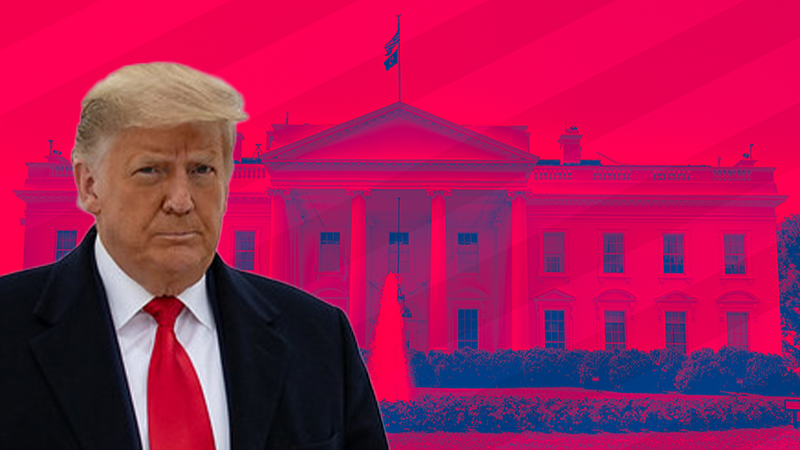Former President Donald Trump has won the 2024 US election against Vice President Kamala Harris this morning (6 November).
The race became clear as Republican Donald Trump flipped battle ground states including Pennsylvania and Georgia early in the morning. With a victory in Wisconsin, Trump reached 277 electoral votes, officially winning the election.
During his campaign, Trump advocated for higher tariffs on China as well as other international trade partners, proposing a 10% tariff on all goods into the US. Trump has also voiced dissent against green energy policies and advocated for a greater return to drilling.
See also: Premier Miton’s Goodwin: Investors must ignore US election noise
Lindsay James, investment strategist at Quilter Investors, said these measures are inflationary and the overall “economic impact of this new Trump presidency is likely to be volatile”.
“Widespread tariffs will now likely be implemented, choking global trade in the meantime, while the deficit is likely to grow ever larger, at a time when markets are getting a little nervous about the sheer scale of spending,” she added.
“While the economy was perhaps the defining feature of this election for voters, an emboldened Trump presidency is likely to add fuel to the fire.”
Although Trump has claimed he could end the conflict with Ukraine in 24 hours, he has been against large funding packages to Ukraine. He also claimed he would let Russia do “whatever the hell they want” to NATO partners not meeting the Alliance’s spending commitments.
Trump focused on defence during his campaign, but this added protectionism will come at a cost, according to John Plassard, senior investment specialist at Mirabaud.
“The federal deficit could widen further under the combined effect of tax cuts and increased military spending,” he said. “On the geopolitical front, tensions are likely to intensify, especially with China and Iran, while transatlantic relations could become more transactional.
“If Europe had hoped for appeasement, it could find itself confronted by a more direct and demanding American diplomacy. In short, Donald Trump’s return promises a revitalised US economy, but at the cost of strained geopolitical stability and a record US deficit.”
These plans could add $7.8trn to the US’ national debt over Trump’s term, according to VT De Lisle America fund manager Richard de Lisle, which may benefit some sectors.
See also: Morningstar: What does the US election mean for investing in China?
“Such measures are likely to maintain current government infrastructure spending plans, sustain consumption and keep the US economy strong,” he added. “Combined with his fierce threats of tariffs, these measures should benefit domestically-focused manufacturers and industrials.”
Justin Onuekwusi, CIO at St. James’s Place, expects increased volatility – particularly among sectors that are tied to international trade such as technology and consumer goods. “On the other hand, his emphasis on deregulation and corporate tax cuts could give short-term boosts to industries like traditional energy, financials, and defence,” he said.
“US smaller companies could be more affected by any post-election volatility but we believe this to be a short-term concern. In our view, the valuation case for global small companies is currently strong and expect over the medium-term US small caps will do well.”
In terms of fixed income, Onuekwusi also expects heightened volatility across bond markets – particularly US treasuries “as sentiment adjusts to the result”.
“Possible higher inflation may also cause yields for long-term bonds to rise higher than short-term bonds,” the CIO explained. “This is sometimes seen as a signal for the start of a strong economic period but can also indicate a time of higher interest rates.
“As the US remains the benchmark for global fixed income, the broader global bond market may feel the ripple effects of this. We will continue to monitor these markets carefully and will adjust positioning should there be a material change in the outlook and opportunity set.”
Stefan Eppenberger, chief investment strategist at Vontobel, believes Trump’s presidency “will stimulate growth through expansive fiscal policy and deregulation, which may favour stocks over bonds”.
“However, excessive growth carries risks, potentially leading to higher interest rates, which could eventually weigh on both the economy and stock markets. Sector-wise, energy and financial stocks may benefit from lighter regulation.”
The election also saw Republicans reclaim the Senate, though the race for the House of Representatives is yet to be called as of 8am 6 November.
Trump became the first former US president that is a convicted felon following the ruling by the NY State Court on the hush money case involving Stormy Daniels. He was found guilty of 34 felony counts in this case.
Trump has also been indicted for federal election interference and election interference in Georgia following his loss in 2020, as well as an indictment for leaving the White House with classified national security documents.









